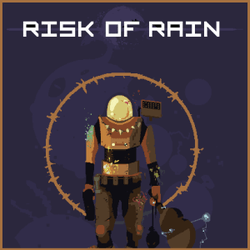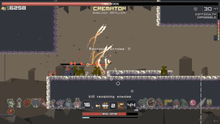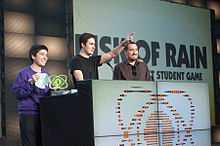Risk of Rain
| Risk of Rain | |
|---|---|
 | |
| Developer(s) | Hopoo Games |
| Publisher(s) | Chucklefish Ltd |
| Engine | Game Maker |
| Platform(s) | Microsoft Windows, PlayStation Vita, OS X, Linux |
| Release date(s) | Windows
|
| Genre(s) | Platform, roguelike |
| Mode(s) | Single-player, multiplayer |
| Distribution | Download |
Risk of Rain is a platform video game incorporating roguelike elements, developed by an indie two-student team from the University of Washington under the name Hopoo Games. The game, initially a student project, was funded through a Kickstarter campaign to improve the title, and was released to Microsoft Windows systems in November 2013. A PlayStation Vita port was announced in February 2014. OS X and Linux versions premiered as part of a Humble Bundle in October 28, 2014.
The player controls the survivor of a space freighter crash on a strange planet. As the player progresses through levels, selected randomly and with some procedural placement of objects within the level, they attempt to survive by killing monsters and collecting items that can boost their offensive and defensive abilities. The game features a difficulty scale that increases with time, requiring the player to choose between spending time building experience and completing levels quickly before the monsters become more difficult. The game supports up to four cooperative players.
Gameplay

At the start of the game, each player selects one of twelve characters. Initially, only one character is available, but as the player completes various in-game objectives, more characters become available. Each character has various statistics and a set of unique moves; for example, a sniper has the ability to hit creatures from a long distance for large damage but their firing rate is slow, while a common soldier can do rapid, moderate damage at close range.
Within all but the last level of the game, the goal is to locate a teleporter, placed in a random location. As the players hunt for it, they will encounter monsters; upon death the monsters will drop in-game money and will also provide the players experience. As the players gain experience they will increase the player level, gaining more hit points and stronger attacks. Money can be used to open various chests, buy items at stores, activate attack drones that aid in combat, or pray at shrines that have a random chance of dropping items, described by game lore as the space freighter's cargo. These items include passive bonuses that improve offensive or defensive capabilities, or a special weapon. Players can only use one special weapon at any time, but they can collect many passive items, including multiple versions of the same item, stacking the benefits of these items. The location of these items is randomly determined through roguelike procedural generation.
Once the players have found the teleporter, they activate it, starting a 90-second countdown which the players must survive. During this time, many more monsters, including at least one boss character, will appear. After the countdown is over, no new monsters will appear but the players will have to defeat all remaining monsters before they can use the teleporter and proceed to the next level. At this time, any remaining money the players have is converted to experience points. At the penultimate level, the players have the option of taking the teleporter to the final level (the crashed ship), or to use the teleporter to run through additional levels as to gain more experience and items; when this latter option is taken, the teleporter on these levels will allow the same choice to either proceed to the final level or continue through additional levels. On the final level, the player must fight a final boss character which if they survive, they are able to escape the planet and win the game.
The difficulty of the game is determined by a timer. The difficulty level increases every 5 minutes up through 10 levels, with newly spawned monsters having more health and stronger attacks. Additionally, boss characters may spawn before the players have found teleporters. If playing alone, the game is over when the player dies. In multiplayer mode, a player that dies must wait until the other players survive to the next level, upon which they are brought back into play.
The item drops are based on the various progress the player has made in the meta-game through repeated playthroughs. For example, defeating certain boss characters for the first time will unlock an item that can then drop in future playthroughs. Other items are based on completing certain goals, such as winning the game a number of times, or performing specific goals with each of the characters. Monsters will also drop log books that describe the monsters, this itself is used to unlock more items.
Development

Risk of Rain was developed by two students at the University of Washington, Duncan Drummond and Paul Morse, later releasing the game under the name Hopoo Games. The two took inspiration from their favorite games in the past and combine them into a single package, focusing primarily on the platformer and roguelike genres.[1] They also wanted to add the idea of a game that scales in difficulty that "puts the player in a sense of urgency and makes them make tough choices often".[1]
Risk of Rain was developed using the GameMaker: Studio tool.[2] The game is presented in 8-bit-like two-dimensional graphics. This economy of graphics allowed them to both develop sprites for new enemies easily, but also allowed them to give a sense of scale to the larger bosses compared to the player's character.[1] Character designs were made to provide enough differences between classes, and to give abilities that relied on the player's skill to give the player satisfaction of playing well, such as introducing a damage boost on the sniper's gun if the player times their reload appropriately.[1] After completing most of the core game on their college budgets, the Hopoo Games team turned to Kickstarter to gain additional funds to update the game to the latest version of GameMaker, obtain a musician to provide music for the game, and additional quality control. The Kickstarter was launched in April 2013 seeking $7,000, and ended up with more than $30,000 in backers. This allowed them to get Chris Christodoulou to compose the game's soundtrack and add several additional gameplay features to the title.[2] The success of the Kickstarter led to a publishing partnership with Chucklefish, Ltd., providing them server space and forums for the game's players. They would later gain help of Matthew Griffin, from Yeti Trunk, another developer that has worked with Chucklefish, to help improve the game's multiplayer code.[3]
The title Risk of Rain was selected not only to allow the game to be easily searchable via the Internet, but came to allude to the concept of a single protagonist in the large game world always worried about "a risk of failure or bad things happening".[1]
The Hopoo team announced in February 2014 that they were working with Sony Computer Entertainment America to bring the game to the PlayStation Vita.[4]
Reception
| Reception | ||||||||||||||||||
|---|---|---|---|---|---|---|---|---|---|---|---|---|---|---|---|---|---|---|
| ||||||||||||||||||
Risk of Rain was named one of the Student Showcase winners of the 2014 Independent Games Festival, and subsequently won the Student Prize Award.[10][11]
References
- ↑ 1.0 1.1 1.2 1.3 1.4 Tach, Dave (2013-08-23). "Risk of Rain hands-on: Retro agoraphobia". Polygon. Retrieved 2014-01-23.
- ↑ 2.0 2.1 Hopoo Games. "Risk of Rain". Kickstarter. Retrieved 2014-01-23.
- ↑ "Risk of Rain: Online Co-op!". Hopoo Games. 2013-07-13. Retrieved 2013-07-13.
- ↑ Tach, Dave (2014-02-11). "Risk of Rain is headed to PlayStation Vita". Polygon. Retrieved 2014-02-11.
- ↑ "Risk of Rain (PC)". Metacritic. Retrieved 2014-01-22.
- ↑ Smith, Quinton (2013-12-12). "Risk of Rain review". Eurogamer. Retrieved 2014-03-20.
- ↑ Reeves, Ben (2013-12-09). "Risk Of Rain". Game Informer. Retrieved 2014-03-20.
- ↑ Woolsey, Cameron (2013-11-19). "Risk of Rain Review". GameSpot. Retrieved 2013-11-19.
- ↑ Kholar, Philip (2013-12-24). "Risk of Rain Review". Polygon. Retrieved 2014-01-23.
- ↑ "Papers, Please takes the grand prize at 16th annual IGF Awards". Gamasutra. 2014-03-19. Retrieved 2014-03-19.
- ↑ "2014 Independent Games Festival announces Student Showcase winners". Independent Games Festival. 2014-01-22. Retrieved 2014-01-22.